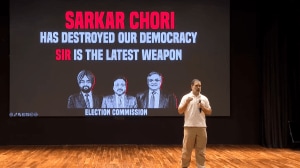Motion’s over, now move
Everybody who participated in, or witnessed, this week’s debate on the no-confidence motion in Parliament obviously must have his or he...

Everybody who participated in, or witnessed, this week’s debate on the no-confidence motion in Parliament obviously must have his or her own take on it.
For Sonia Gandhi, in spite of the numbers advantage being so squarely with the other side, it was an opportunity to put the government on the mat in the last session before her party’s governments in four states face the BJP’s challenge this autumn. Advani said this was a great opportunity for the government to project its achievements.
For so many Congressmen, and their new, half-reluctant third front allies, it was to be a crucial test of a Sonia coming of age. For George Fernandes, it was a rare opportunity to be heard by the Opposition in a Parliament where he has been shunned by them for nearly two years.
My outlook was determined by my reddened, swollen eyes. You need some unusual excuse to spend so much time watching a Parliament debate on television. Confined to working from home by that itchy bellwether of a great Indian monsoon, the conjunctivitis virus, the live debate telecast was a real, time-pass relief.
So much more fun than the news channels and less depressing than Champions Trophy hockey. But there were times when you thought our politicians had also been hit by the remix virus currently sweeping the music channels. The arguments, the charges and counter-charges, the defence and the boasts, even one-liners, were all old, repetitive and barely re-packaged.
Thank God in the end for the short, but so prime ministerial a reply by the prime minister. A big leader never wastes time in too much detail, in ferreting out percentages and decimals, growth rates and forex balance. He makes the big, general statement, or puts forward an idea. Vajpayee did not even have to go that far. Just watch that reply again, or read the text, and you know why he is such a master of the set-piece, why he towers over everybody else in our politics as a communicator. Which other prime minister could, with a barely concealed smirk, get away with describing the Samajwadi Party’s charge of victimisation by his own ally Mayawati as the “karistani’ (untranslatable, but probably, the handiwork) of a state government and therefore not the responsibility of his own government? So pointless had the whole exercise been, and so short of ideas, that he dismissed it cruelly, without even bothering to answer any of the charges, with a “the fun is over, let’s get back to work” kind of a message.
INTERESTING thing, however, is whether that message was understood by his own partymen as well. This must be the first government in our history which is more tempted with the idea of an early election rather than staying on in power for the full term.
Usually, in parliamentary democracies it is the opposition which does not have the patience to sit out a whole five years and keeps trying to destabilise and topple the government so as to precipitate an earlier election, and a shot at power. This government is unique in having started not merely speculation but active public discussion on an early election, thereby curtailing its own term.
It is difficult to say whether the objective is tactical, a kind of psychological warfare to keep the Congress off-balance, or whether the leading lights of the BJP so love the rhetoric of an election campaign that they want it to happen every other year. But, on all evidence so far, the only party which seems to have been thrown off-balance by the talk of an early election is the BJP itself. The consequences are already damaging the quality of governance and can be disastrous for the NDA in the long run.
Opening the NDA’s defence on the motion, Advani raised some important issues. Why a no confidence motion now, he asked. The government was stable, Congress did not have the numbers to even cause fleeting concern on the treasury benches. There was no real crisis in the country, the economy was doing well, the foreign policy had been counting its finest hours at the rate of three a month, the monsoon was good, the stock markets were up, the government had done so well (even warded off Sars), a man who could corrupt George Fernandes had not yet been born, so why a no confidence motion at this time, was the argument of the ruling coalition. And it was a pretty solid argument that was finally sealed with a 312 to 186 vote.
THE leading lights of the NDA would do well now to use the same argument to ask themselves a different question. If everything is so hunky-dory with the government, if the nation is having its finest period of governance in a long time, if the coalition is so stable that both the DMK and AIADMK are forced to support it, what justification do they have in constantly rumour-mongering on the prospects of early elections?
Election-year jitters are a common phenomenon in democracies. But to get into election mode a clear year and a half before the general election is due is criminal. But this is precisely what this government has done to itself.
Politicians work and live by instinct and hawa. Because most of the speculation and kite-flying on an early election has come from the leaders of the BJP — including its president — it has had the unfortunate effect of sending this government into election mode so prematurely that it may end up causing damage not just to itself but to the national interest itself.
A government that is so electorally sensitive as to even remove a very successful and honest minister of urban affairs just so as to please a couple of lobbies on the eve of a municipal election is unlikely to function normally if it begins to sniff an early general election in the air.
And we have already seen straws in that wind: the humiliating postponement on the introduction VAT, the banana republic-like flip-flops on the introduction of CAS, announcement of populistic schemes including unsustainable interest rates on provident funds, the complete junking of the disinvestment programme, are all to be blamed on the same self-defeating mindset.
Yet it is funny that the prime minister closes the no confidence debate with a let’s get back to work message, his deputy questions the justification behind the whole exercise given the stability of his government, and there is a 312-186 verdict in favour of the government. What justification can there be for the ruling coalition to call an earlier election?
It is time to put that speculation to rest, and along with that the uncertainty and the tentativeness it brings in the government’s responses. If the NDA carries on like this, wallowing in the glory of a high growth year now but not building on it for a repeat the next, it could undo some of the good work it has done so far.
Also, it could leave the voters very bored and angry. Already, the mood is changing, as indicated by the latest India Today poll. Any sudden, mid-term poll in a situation of so much stability will be seen as a purely cynical exercise and it could make the voter angry.
At the same time, suspension of governance, putting aside hard decisions, giving economic reforms a holiday will not only be acts greatly detrimental to the national interest, they would also splash some red ink on the NDA’s report card when election actually takes place towards the end of 2004. It is time, therefore, to stop thinking elections now and to get down to running the government.
There is still a year and quarter, another budget, a good growth year, booming stock markets and corporate bottomlines to launch you into another good year when the feel-good factor could be a lot stronger. But for that, hard work will have to be done now rather than kite-flying on “early” elections.
Write to sgexpressindia.com



- 01
- 02
- 03
- 04
- 05




























